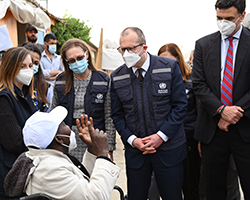For the common good: patients and health workers tell Regional Director of COVID-19 challenges and hopes for the future during country visit

WHO
Health-care workers and patients were an important focus of WHO Regional Director for Europe Dr Hans Henri P. Kluge’s visit to Greece last week. During the second day of his visit, Dr Kluge spoke directly with health-care professionals and individuals at the accommodation site for refugees and migrants in Eleonas and the mega-vaccination centre Prometheus in Maroussi, northern Athens.
Leaving no one behind
Arriving at the Eleonas refugee and migrant camp, Dr Kluge was welcomed by Greek Minister of Health Dr Vassilis Kikilias as well as President of the National Public Health Organization (EODY) Mr Panagiotis Arkoumaneas.
The accommodation site has been operational since August 2015, and provides shelter to approximately 2200 individuals of more than 20 nationalities. Health-care services in the camp are provided by PHILOS – Emergency Health Response to Refugee Crisis, a programme of the Greek Ministry of Health that is implemented by EODY.
During a tour of the site, Dr Kluge spoke with Amin, an asylum seeker from Nigeria, who recounted his journey and experience with the health-care system in Greece. Amin explained that he had to leave Nigeria for political reasons, following the deaths of both of his parents. Born and raised in Nigeria to a Nigerian mother and Somali father, Amin suffers from a number of health conditions, including diabetes, which led to the amputation of one leg, glaucoma, kidney failure and hepatitis B.
Dr Kluge asked Amin about his journey to Greece. “I had to leave Nigeria,” Amin said, “so I got to Lebanon, and then to Turkey and from there to Greece. It was a very dangerous road.” However, Amin also shared that he has hope: “Things are difficult,” he said, “I have a lot of problems. But I have hope.”
Support of health workers
Amin spoke of the support he has been receiving from health-care workers, including his social worker Christina, who has been working for EODY since December 2019 and is currently working with Amin in the Eleonas camp as part of the PHILOS programme.
Christina has worked with Amin daily for the past year, supporting him in getting access to primary health-care services, which are provided within the camp. Depending on the issue Amin is facing, Christina may accompany him to a hospital for further assistance. Through her role as a social worker, Christina also helps Amin to participate in various integration programmes and make progress with his asylum request. They share a close relationship, and Amin wishes to stay in Greece largely because of the support and assistance he receives from his care workers.
“I wish to you a lot of courage,” Dr Kluge said to Amin at the conclusion of their conversation. “At WHO, we believe in leaving no one behind. There is always hope.”
“Working for the good of the people”
Following his visit to the Eleonas camp, Dr Kluge, accompanied by the Minister of Health as well as Secretary General for Primary Health Care Dr Marios Themistocleous, visited one of the mega-vaccination centres of Athens: the Prometheus centre in the HELEXPO exhibition and congress building in Maroussi. Dr Kluge toured the facility and spoke with people receiving their vaccines.
The mega-vaccination centre is mostly staffed by members of the Hellenic military forces. As such, the centre delivers a clear message about the critical importance of collaboration across government agencies and the need to unite in a common effort against the virus.
Over 2.5 million vaccinations have been carried out in Greece. Just over 1.7 million people have received their first dose, and 770 000 are currently fully covered with both doses.
Dr Kluge spoke with 2 health-care workers at the centre, Nikos and Maria. “We are working for the good of the people,” said Nikos, a plastic surgeon with the navy who has been working there for several months.
Prior to assuming duties at the centre, Nikos was completing his residency in the United Kingdom. He explained the challenges he encountered while bringing his family back during the first wave of the pandemic. He managed to get his family to Greece on the last flight out of the United Kingdom, but the stress of the family’s separation weighed heavily on him until then.
Nikos has first-hand experience with COVID-19, as he caught the virus a few months ago. He experienced very mild symptoms and has now recovered fully. However, as he told Dr Kluge, the period during which he was sick was particularly stressful, as his wife is also a health-care worker and they have a 2-year-old child at home.
“What I am doing now is my contribution to society,” Nikos stated. “A military doctor has to be ready in both times of war and times of peace. The people I see at the vaccination centre every day are, in my eyes, my mother and my father. I feel proud about my country and the way it has addressed the pandemic.”
Vaccination as a common good
“Everyone should get vaccinated for the common good,” said Maria, “and in order to be able to see our loved ones again.” Maria, a nurse enlisted with the air force, is originally from Nafplio, Greece. She also experienced a COVID-19 scare, and although she did not contract the virus, she has shared the challenges of living alongside the virus every day, adapting to this new reality and being separated from loved ones for extended periods of time.
In Maria’s experience, most people who come to the vaccination centre abide by the public health and social measures and are eager to receive their vaccines.
The Regional Director thanked Maria and Nikos for their work while also congratulating the organization of the vaccination centre, commending the positive feedback he heard from those getting their vaccines and highlighting the importance of working together to defeat COVID-19.



